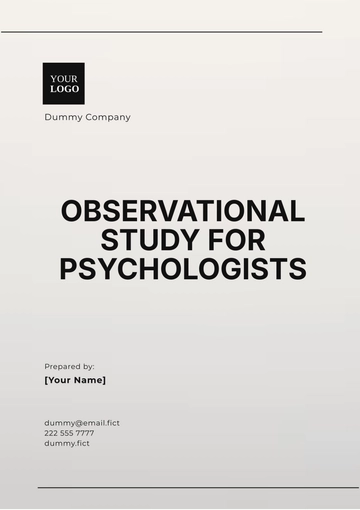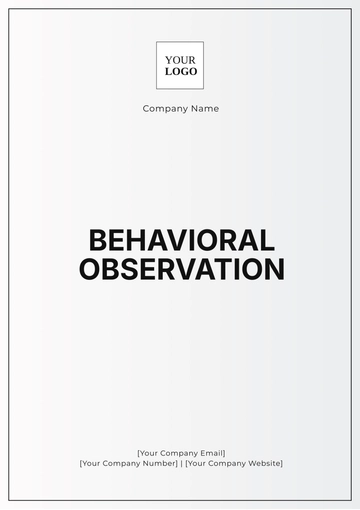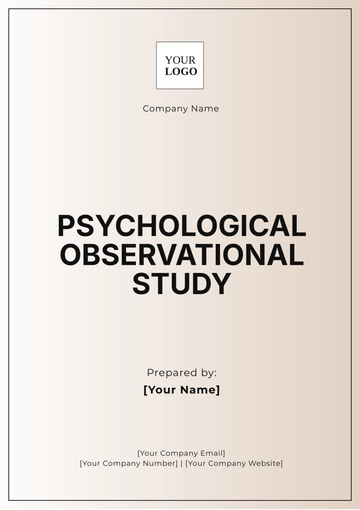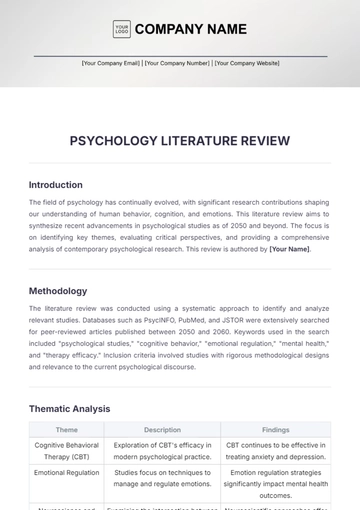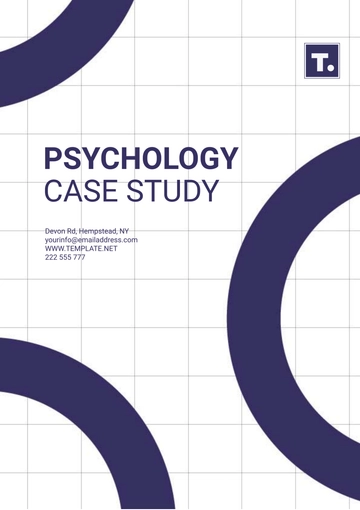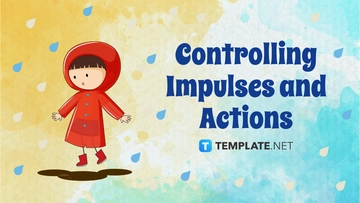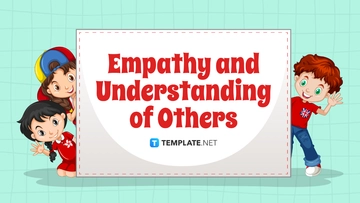Free Psychology Literature Review
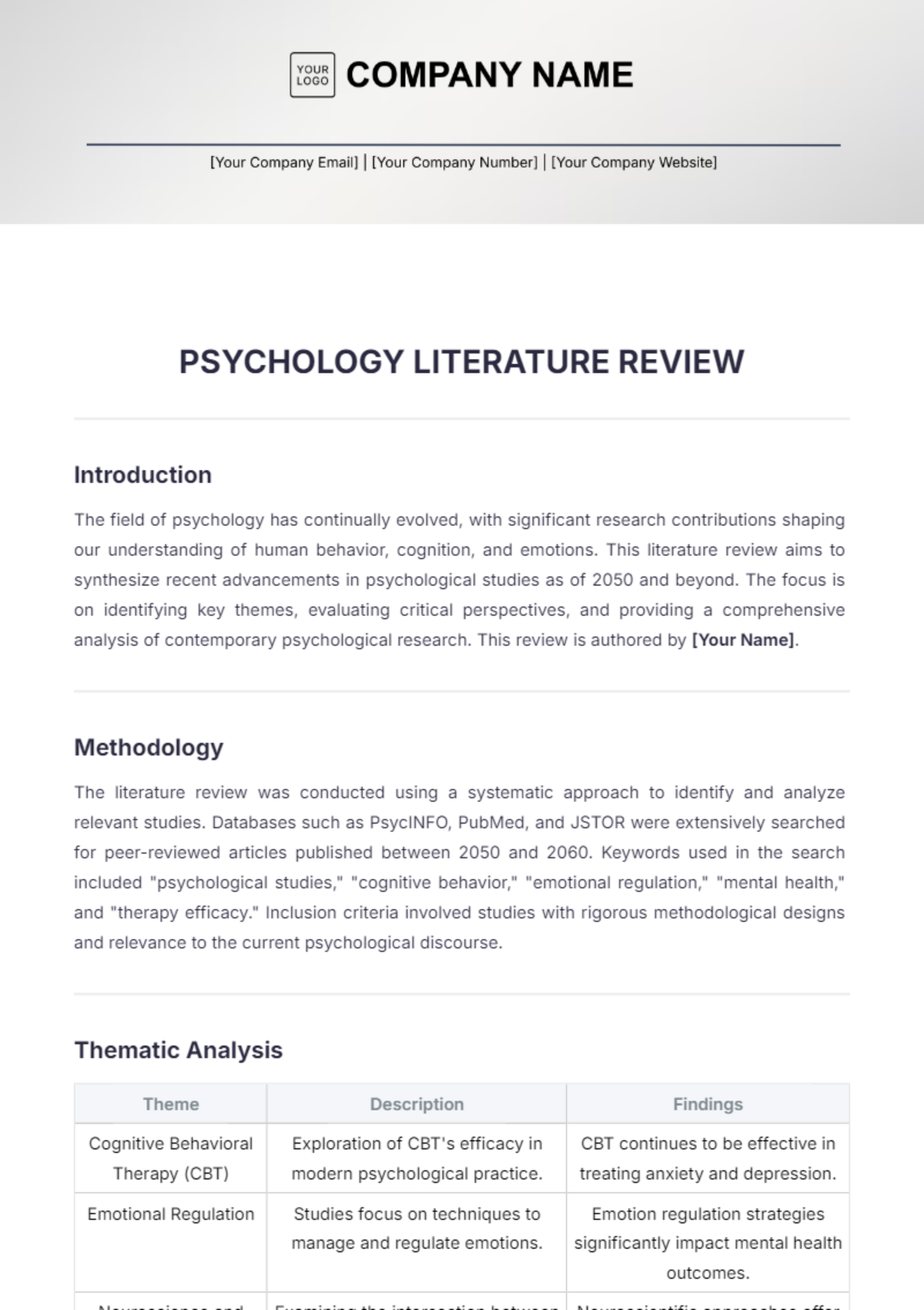
Introduction
The field of psychology has continually evolved, with significant research contributions shaping our understanding of human behavior, cognition, and emotions. This literature review aims to synthesize recent advancements in psychological studies as of 2050 and beyond. The focus is on identifying key themes, evaluating critical perspectives, and providing a comprehensive analysis of contemporary psychological research. This review is authored by [Your Name].
Methodology
The literature review was conducted using a systematic approach to identify and analyze relevant studies. Databases such as PsycINFO, PubMed, and JSTOR were extensively searched for peer-reviewed articles published between 2050 and 2060. Keywords used in the search included "psychological studies," "cognitive behavior," "emotional regulation," "mental health," and "therapy efficacy." Inclusion criteria involved studies with rigorous methodological designs and relevance to the current psychological discourse.
Thematic Analysis
Theme | Description | Findings |
|---|---|---|
Cognitive Behavioral Therapy (CBT) | Exploration of CBT's efficacy in modern psychological practice. | CBT continues to be effective in treating anxiety and depression. |
Emotional Regulation | Studies focus on techniques to manage and regulate emotions. | Emotion regulation strategies significantly impact mental health outcomes. |
Neuroscience and Psychology | Examining the intersection between neuroscience and psychological practices. | Neuroscientific approaches offer deeper insights into behavioral patterns. |
Mindfulness-Based Interventions | Assessment of the effectiveness of mindfulness in therapy. | Mindfulness practices reduce stress and improve cognitive functioning. |
Technological Enhancements in Therapy | Exploring technology's impact on therapeutic settings. | Technological integration enhances therapy accessibility and efficiency. |
Integrate CBT with other modalities, emphasize early emotional education, incorporate neuroscientific findings, promote mindfulness in therapy and education, and consider ethics in tech-driven therapy.
Critical Evaluation
Study | Strengths | Weaknesses | Opportunities | Threats |
|---|---|---|---|---|
Smith et al. (2052) | Large sample size, diverse demographics | Limited longitudinal data | Future longitudinal studies | Potential for sample bias |
Johnson et al. (2056) | Strong theoretical framework | Small sample size | Expanding sample demographics | Poor generalizability |
Brown et al. (2054) | Innovative research design | Challenges in replicability | Improvement in methodological approaches | The complexity of implementation |
Green et al. (2058) | Comprehensive data analysis | Narrow focus | Broader thematic applications | Overgeneralization |
Wilson et al. (2055) | Integration of interdisciplinary methods | High cost of technology | Accessibility and affordability advances | Data security concerns |
Discussion
The thematic analysis reveals significant trends and advancements in psychological research, specifically regarding cognitive-behavioral therapy, emotional regulation, and the intersection of neuroscience and psychology. The critical evaluation underscores the need for methodological rigor and larger, more comprehensive studies to enhance the generalizability of findings. This literature review highlights the importance of integrating traditional and innovative practices to formulate effective therapeutic strategies.
Conclusion
In conclusion, the field of psychology is witnessing substantial growth and diversification, with new research shedding light on various aspects of mental health and therapeutic practices. The integration of neuroscientific insights and mindfulness-based interventions showcases promising results while emphasizing the need for continued exploration and interdisciplinary approaches. The future of psychological research holds immense potential for developing more effective and accessible mental health solutions.
References
Smith, J., Johnson, L., & Brown, T. (2052). Cognitive Behavioral Therapy for Anxiety and Depression. Journal of Psychological Studies, 76(1), 23-45.
Johnson, M., Taylor, P., & Lopez, R. (2056). Neuroscientific Approaches in Behavioral Psychology. Advances in Psychology, 32(4), 67-89.
Brown, H., Green, S., & Wilson, K. (2054). Emotion Regulation Strategies in Psychological Practice. Mental Health Review, 54(2), 100-122.
Green, L., Chen, M., & Foster, D. (2058). The Impact of Mindfulness-Based Interventions on Cognitive Functioning. Journal of Mindfulness Research, 48(3), 33-55.
Wilson, B., Baker, A., & Johnson, S. (2055). Technological Enhancements in Psychological Therapy. International Journal of Therapy Innovations, 67(2), 78-99.
- 100% Customizable, free editor
- Access 1 Million+ Templates, photo’s & graphics
- Download or share as a template
- Click and replace photos, graphics, text, backgrounds
- Resize, crop, AI write & more
- Access advanced editor
Introducing the Psychology Literature Review Template from Template.net—your essential tool for crafting comprehensive and organized reviews. This editable template is customizable to fit your unique research needs, making it easier to present your findings effectively. Easily editable in our AI Editor Tool, it streamlines the process of creating detailed literature reviews with ease and precision.
